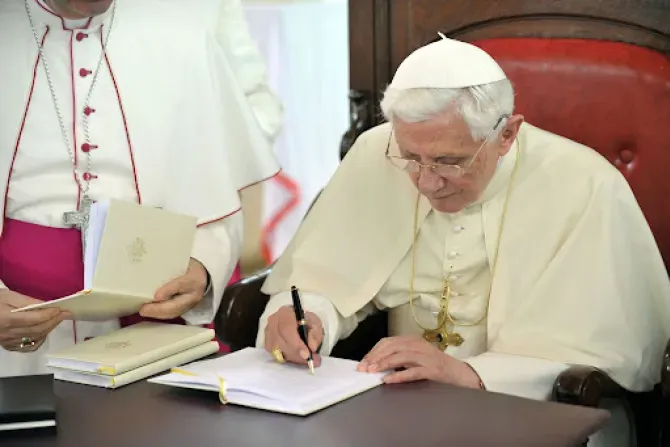2. “Each of us is the result of a thought of God. Each of us is willed, each of us is loved, each of us is necessary.” — Homily, St. Peter’s Square, April 24, 2005
3. “If we allow the love of Christ to change our heart, then we can change the world. This is the secret of authentic happiness.” — Guanajuato, Mexico, Mach 24, 2012
4. “Love is the light — and in the end, the only light — that can always illuminate a world grown dim and give us the courage needed to keep living and working. Love is possible, and we are able to practice it because we are created in the image of God.” — Deus Caritas Est
5. “Love grows through love.” — Deus Caritas Est
6. “The love-story between God and man consists in the very fact that this communion of will increases in a communion of thought and sentiment, and thus our will and God’s will increasingly coincide: God’s will is no longer for me an alien will, something imposed on me from without by the commandments, but it is now my own will, based on the realization that God is in fact more deeply present to me than I am to myself.” — Deus Caritas Est
7. “If you follow the will of God, you know that in spite of all the terrible things that happen to you, you will never lose a final refuge. You know that the foundation of the world is love, so that even when no human being can or will help you, you may go on, trusting in the One that loves you.” — “Jesus of Nazareth”
8. Jesus’ “death on the Cross is the culmination of that turning of God against himself in which he gives himself in order to raise man up and save him. This is love in its most radical form.” — Deus Caritas Est
9. “Anyone who really wanted to get rid of suffering would have to get rid of love before anything else, because there can be no love without suffering, because it always demands an element of self-sacrifice, because, given temperamental differences and the drama of situations, it will always bring with it renunciation and pain.
“When we know that the way of love — this exodus, this going out of oneself — is the true way by which man becomes human, then we also understand that suffering is the process through which we mature.” — “God and the World: A Conversation with Peter Seewald”
10. “Mary is a woman who loves. How could it be otherwise? As a believer who in faith thinks with God’s thoughts and wills with God’s will, she cannot fail to be a woman who loves. We sense this in her quiet gestures, as recounted by the infancy narratives in the Gospel. We see it in the delicacy with which she recognizes the need of the spouses at Cana and makes it known to Jesus. We see it in the humility with which she recedes into the background during Jesus’ public life, knowing that the Son must establish a new family and that the Mother’s hour will come only with the Cross, which will be Jesus’ true hour.” — Deus Caritas Est








